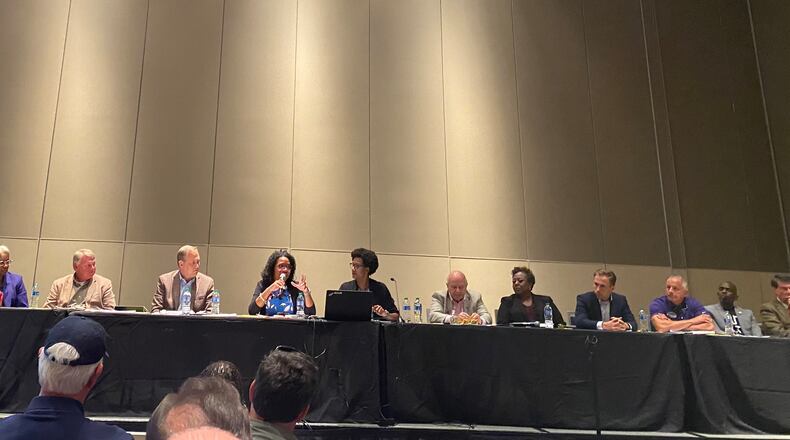A rise in property taxes, a reduction in emergency services and layoffs could take place if 15 cities in negotiations with Fulton County cannot keep their respective local option sales tax revenue, city officials said at a Wednesday town hall.
“This is not going well,” Bianca Motley Broom, mayor of College Park, said during the event. “We have to figure out what in the world we are going to do if LOST isn’t around because, again, we can’t play politics with public safety.”
Thirteen officials including mayors, city managers and council members representing north and south Fulton cities held the town hall at the Georgia International Convention Center to openly discuss their fight with Fulton over LOST revenue.
The cities were informed by the Fulton Board of Commissioners in July that the county wants to increase its share of the sales tax revenue to 35%. It is currently less than 5%.
During mediation last Friday, Fulton suggested a percentage rate increase of between 7% and 19%, East Point Mayor Deana Holiday Ingraham said.
In 2019, cities across Georgia received more than $745 million collectively in LOST revenues, according to data presented at the forum. A total of $3 billion of sales tax revenue generated from the cities over the next 10 years is at risk, officials said.
The Wednesday town hall was led by Motley Broom in College Park and drew more than 100 people. She was joined by Holiday Ingraham and mayors Khalid Kamau of South Fulton, J. Clark Boddie of Palmetto, Mario Avery of Fairburn and Alan Hallman of Hapeville. City managers from Union City and Chattahoochee Hills were also on the panel, as well as mayors from Alpharetta, Johns Creek, Milton and Sandy Springs.
Kiplyn Primus, host of WCLK’s “The Local Take” moderated the event.
Fulton Commissioners were invited to the meeting but none attended. North Fulton officials hosted a public forum on LOST last week at Roswell City Hall.
The LOST is a one-penny sales tax that local governments use to pay for such services as police and fire, transportation, recreation and parks, and more. Currently, Fulton cities’ collectively share 95% of LOST revenue, leaving the county less than 5%.
The cities complain that Fulton commissioners have not stated what services the increased share of revenue would pay. Courts, the jail, elections, the sheriff’s department and education are not eligible for the LOST funds, Sandy Springs Mayor Rusty Paul said during a presentation.
Thursday, Commissioner Bob Ellis said that assertion is wrong and the county’s stance on LOST has been mischaracterized. A Fulton increase in LOST revenue would go towards those services and more, he said.
State law requires a renegotiation of the distribution of LOST revenue every 10 years, and the county’s share of revenue has decreased over the past decades as communities incorporated to become cities. The revenue was directed to the new cities.
During the town hall, mayors said they stand to lose many millions of dollars from their city budgets. The next mediation date with Fulton County is scheduled for Oct. 7.
“If we were to lose LOST... we would have to raise our millage rate at least 3.3 mills to make up the difference in our property taxes,” Avery said about Fairburn’s budget. “Property taxes is about 53% of our budget. The next largest source of revenue is our local option sales tax revenue.”
The cities recently launched the website savefultoncities.com.
About the Author
Keep Reading
The Latest
Featured




